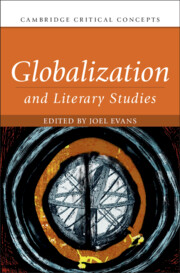Book contents
- Globalization and Literary Studies
- Cambridge Critical Concepts
- Globalization and Literary Studies
- Copyright page
- Contents
- Figures
- Tables
- Contributors
- Acknowledgements
- Introduction
- Part I Origins
- Chapter 1 The Ecology of Globalization
- Chapter 2 Forms of Premodern Literary Circulation
- Chapter 3 The End of History
- Chapter 4 Translation
- Chapter 5 Empire
- Part II Development
- Part III Application
- References
- Index
Chapter 5 - Empire
The Nineteenth-Century Global Novel in English
from Part I - Origins
Published online by Cambridge University Press: 01 April 2022
- Globalization and Literary Studies
- Cambridge Critical Concepts
- Globalization and Literary Studies
- Copyright page
- Contents
- Figures
- Tables
- Contributors
- Acknowledgements
- Introduction
- Part I Origins
- Chapter 1 The Ecology of Globalization
- Chapter 2 Forms of Premodern Literary Circulation
- Chapter 3 The End of History
- Chapter 4 Translation
- Chapter 5 Empire
- Part II Development
- Part III Application
- References
- Index
Summary
The chapter analyses the integral role that literary writing in English, and especially the realist novel, played in imaginatively shaping, structuring and on occasion obscuring processes of nineteenth-century globalization. Taking Charles Dickens’s Dombey and Son (1848) and Olive Schreiner’s The Story of an African Farm (1883) as case studies, we make two main points: first, that empire formed the constitutive ground of processes of globalization in the period; and, second, that realist fiction provided a means through which these processes could be understood and questioned, from vantage points both metropolitan or northern (Dickens) and peripheral or southern (Schreiner). We proceed in this chapter on the conviction that imperialism was an essential aspect of globalization throughout the long nineteenth century, redistributing wealth and restructuring the global economy in favour of imperial power. Globalization and empire were therefore folded into one another, taking on different features at their geographic and economic cores and peripheral edges. Taking illustrative examples from Dickens in the heart of the Empire and Schreiner at a zone of peripheral extraction, the chapter captures two contrasting yet complementary literary responses to this system.
Keywords
- Type
- Chapter
- Information
- Globalization and Literary Studies , pp. 80 - 94Publisher: Cambridge University PressPrint publication year: 2022



